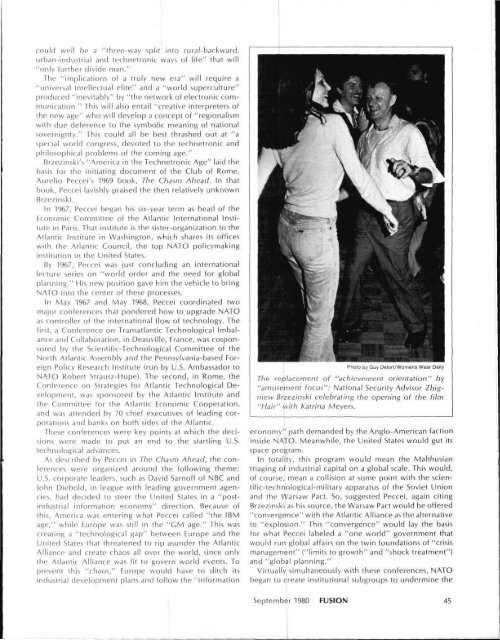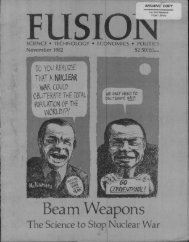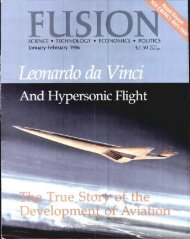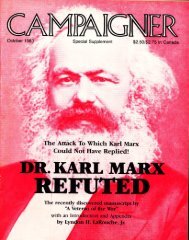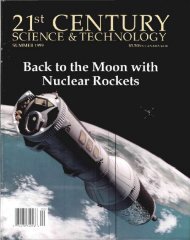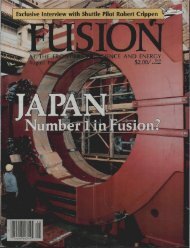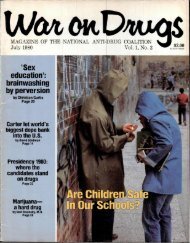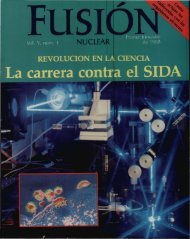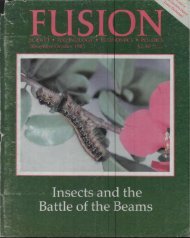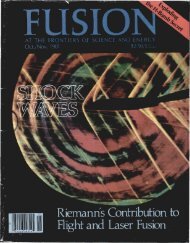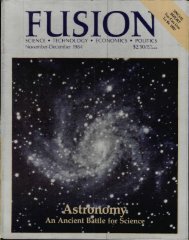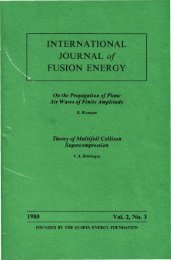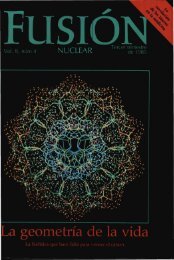could well be a "three-way split; into rural-backward,urban-industrial and technetronic ways of life" that will"only further divide man."The "implications of a truly new era" will require a"universal intellectual elite" and a "world superculture"produced "inevitably" by "the network of electronic communication."This will also entail "creative interpreters ofthe new age" who will develop a concept of "regionalismwith due deference to the symbolic meaning of nationalsovereignty." This could all be best thrashed out at "aspecial world congress, devoted to the technetronic andphilosophical problems of the coming age."Brzezinski's "America in the Technetronic Age" laid thebasis for the initiating document of the Club of Rome,Aurelio Peccei's 1969 book, The Chasm Ahead. In thatbook, Peccei lavishly praised the then relatively unknownBrzezinski.In 1967, Peccei began his six-year term as head of theEconomic Committee of the Atlantic International Institutein Paris. That institute is the sister-organization to theAtlantic Institute in Washington, which shares its officeswith the Atlantic Council, the top NATO policymakinginstitution in the United States.By 1967, Peccei was just concluding an internationallecture series on "world order and the need for globalplanning." His new position gave him the vehicle to bringNATO into the center of these processes.In May 1967 and May 1968, Peccei coordinated twomajor conferences that pondered how to upgrade NATOas controller of the international flow of technology. Thefirst, a Conference on Transatlantic Technological Imbalanceand Collaboration, in Deauville, France, was cosponsoredby the Scientific-Technological Committee of theNorth Atlantic Assembly and the Pennsylvania-based ForeignPolicy Research Institute (run by U.S. Ambassador toNATO Robert Strausz-Hupe). The second, in Rome, theConference on Strategies for Atlantic Technological Development,was sponsored by the Atlantic Institute andthe Committee for the Atlantic Economic Cooperation,and was attended by 70 chief executives of leading corporationsand banks on both sides of the Atlantic.These conferences were key points at which the decisionswere made to put an end to the startling U.S.technological advances.As described by Peccei in The Chasm Ahead, the conferenceswere organized around the following theme:U.S. corporate leaders, such as David Sarnoff of NBC andJohn Diebold, in league with leading government agencies,had decided to steer the United States in a "postindustrialinformation economy" direction. Because ofthis, America was entering what Peccei called "the IBMage," while Europe was still in the "GM age." This wascreating a "technological gap" between Europe and theUnited States that threatened to rip asunder the AtlanticAlliance and create chaos all over the world, since onlythe Atlantic Alliance was fit to govern world events. Toprevent this "chaos," Europe would have to ditch itsindustrial development plans and follow the "informationeconomy" path demanded by the Anglo-American factioninside NATO. Meanwhile, the United States would gut itsspace program.In totality, this program would mean the Malthusiantriaging of industrial capital on a global scale. This would,of course, mean a collision at some point with the scientific-technological-militaryapparatus of the Soviet Unionand the Warsaw Pact. So, suggested Peccei, again citingBrzezinski as his source, the Warsaw Pact would be offered"convergence" with the Atlantic Alliance as the alternativeto "explosion." This "convergence" would lay the basisfor what Peccei labeled a "one world" government thatwould run global affairs on the twin <strong>foundation</strong>s of "crisismanagement" ("limits to growth" and "shock treatment")and "global planning."Virtually simultaneously with these conferences, NATObegan to create institutional subgroups to undermine theSeptember 1980 FUSION 45
progress of science and encourage the development ofenvironmentalist movements. In 1966-1967, NATO createda Division of Scientific Affairs, with a subgroup called"Human Factors," which housed a special advanced psychologicalwarfare unit under the title, "InternationalCommittee of Social Scientists." In 1968-1969, NATO createdits "Committee on the Challenges of Man and Society/'whose environmental subcommittee initiated a seriesof investigations into the role of solar power and otherinefficient <strong>energy</strong> sources in Europe's <strong>energy</strong> future. TheCommittee on Challenges also was set up as a vehicle forresearch on the effects of scientific progress on papulationsand similar profiles.While this new world strategy was being prepared withinNATO, Peccei established the framework of "global planning"and "crisis management"institutions in a seriesof consultations with key officials.One was McGeorgeBundy, former National SecurityCouncil chief duringthe Cuba Missile Crisis. Asecond was NATO advisorAlexander King, then the directorgeneral of scientificaffairs for the Organizationfor European Cooperationand Development. A thirdwas Dr. Homer Perlmutter,editor of Tavistock's magazineHuman Relations. Pecceialso met extensively withWhite House officials andwith the State DepartmentPolicy Planning Staff Council.Finally, Peccei traveled tothe headquarters of the TavistockInstitute of Human Relationsin Sussex, England inmid-1968, where the decisionson how to proceed in transforming NATO policywere finalized. The strategic attempt would be miade toinduce the Soviets into "convergence" by means df "disarmament"and similar efforts and through ideological/psychological manipulations centered around the offer ofcooperation in "systems analysis." Bundy would offer theSoviets an "entry-point" into NATO's "new age" tffiroughthe Vienna-based International Institute of Applied SystemsAnalysis (IIASA, formally founded in 1972)^ whileKing would target the Soviets through "multidisciplinarystudies" in his International Federation of Institutes ofAdvanced Studies (IFIAS, founded with Rockefeller Foundationmoney in 1973).The domestic job of brainwashing the populations ofNATO countries, with special emphasis on the Americanpopulation, would be coordinated by a "Club of Rome"to be founded by Peccei and King, with the TavistockInstitute functioning as the evaluator/controller of theprocess. The marching orders for this Club of Rorrje were46 FUSION September 1980The magazine of jhe World Future Society: Peopleare the problem.given to Peccei at a meeting in the summer of 1968 inBellagio, Italy, with, he writes, "the most respected gurusof long-range forecasting and planning." In a final "BellagioDeclaration," Peccei and the gurus attacked "blindreliance on science" and called for "the modification ofthe very structure of the human systems" as the requiredalternative.Soon after this, in late 1968, the Club of Rome wasfounded at a meeting of those men Peccei assembled tobe the core of what he called a future World Forum tooversee "global planning" and "crisis management." Thiswas to be the "technocratic dictatorship" ruling over the"postindustrial information economies" described byBrzezinski and others. The core group would ensure thatNATO would manage that global transformation.Aside from Peccei andKing, the original motivatorsof the Club of Rome includedHugo Thiemann, advisorto the Swiss Nestle's interestsand head of the Battelle Institutein Geneva, part of theorganizational nexus tied tothe Tavistock-linked BattelleMemorial Institute in Columbus,Ohio; Max Kohnstamm,a Dutch international affairsexpert and right-hand man toJean Monnet; Dennis Gabor,a British physicist and NobelPrize winner; and Jean Saint-Geours, a coworker of theWellsian de Jouvenel, Peccei'smentor.These men provided whatwas to become the executivecommittee group of the Clubof Rome, along with FritzBottcher, a scientific advisorto the Dutch government;Eduard Pestel, formerly of the Technical University ofHannover and more recently Minister of Science andCulture of Lower Saxony in West Germany; and SaburoOkita, former head of the Japanese foreign aid fund andcurrently the Japanese foreign minister who is leadingJapan into closer military alignment with NATO.As this grouping developed its operational stage withthe "Limits to Growth" psychological-warfare assault inthe early 1970s, several U.S. representatives were added tobring the United States into the NATO/Club of Romeumbrella. Aside from the "Limits" report authors, JayForrester and Dennis Meadows, the Club of Rome Internationalwas expanded to include Senator Claiborne Pell(D-R.l.), ambassador to NATO and sponsor of severalpieces of legislation calling for the creation of an "environmentalistworld-order" under NATO control, and SolLinowitz, former chairman of Xerox.As the U.S. involvement in the Club of Rome wasexpanded in the 1972-1975 period with the eventual for-
- Page 2 and 3: FUSIONMAGAZINE OF THE FUSION ENERGY
- Page 4 and 5: of the Academy drew an editorial bl
- Page 6 and 7: LettersRiemann Vs. Darwin:Evolution
- Page 8 and 9: LettersContinued from page 7The Aut
- Page 10 and 11: News BriefsCarlos de HoyosUwe Parpa
- Page 12 and 13: News BriefsU.S. BUDGET CUTS TARGET
- Page 14 and 15: Special ReportWhy MonetarismDestroy
- Page 16 and 17: according to Mitchell, the seminal
- Page 18 and 19: the worst accident that could possi
- Page 20 and 21: subways), fossil-fueled power plant
- Page 22 and 23: should be started now, Levitt state
- Page 24 and 25: TheNASAStoryThe Fight forAmerica'sb
- Page 26: To one leading military faction at
- Page 29 and 30: created since the midcentury, in at
- Page 31 and 32: created the rockets and all the ins
- Page 33: While the military and the presiden
- Page 36 and 37: James E. Webb (right), the NASA adm
- Page 38 and 39: NASAAnatoly Dobrynin (foreground),
- Page 40 and 41: TheNATOPlan to KillUS. Scienceby Ma
- Page 42 and 43: Europe, Bertrand de Jouvenel, himse
- Page 46 and 47: mation of a U.S. Association for th
- Page 48 and 49: continued development of high-power
- Page 50 and 51: intense beam of laser light, ions,
- Page 52 and 53: toward the generation of "hot" elec
- Page 54 and 55: system that combined the KrF with a
- Page 56 and 57: Others have charged that scientists
- Page 58 and 59: AAAS-Brookings Conf.:Nonscience Age
- Page 60 and 61: Siberian development is at thecente
- Page 62 and 63: tition from the antinuclear Union o
- Page 64 and 65: as the primary driver to implode th
- Page 66 and 67: A CDC spokesman said that thenew sy
- Page 68 and 69: Space Science& TechnologyThe Solar
- Page 70 and 71: hoto by C. Srinivasen/United Nation
- Page 72 and 73: 1975. This index has been at or bel
- Page 74 and 75: course, the primary cooling systemi
- Page 76 and 77: _The Young Scientist.What IsEnergy?
- Page 78 and 79: Lyndon LaRoucke, Democrat for Presi


